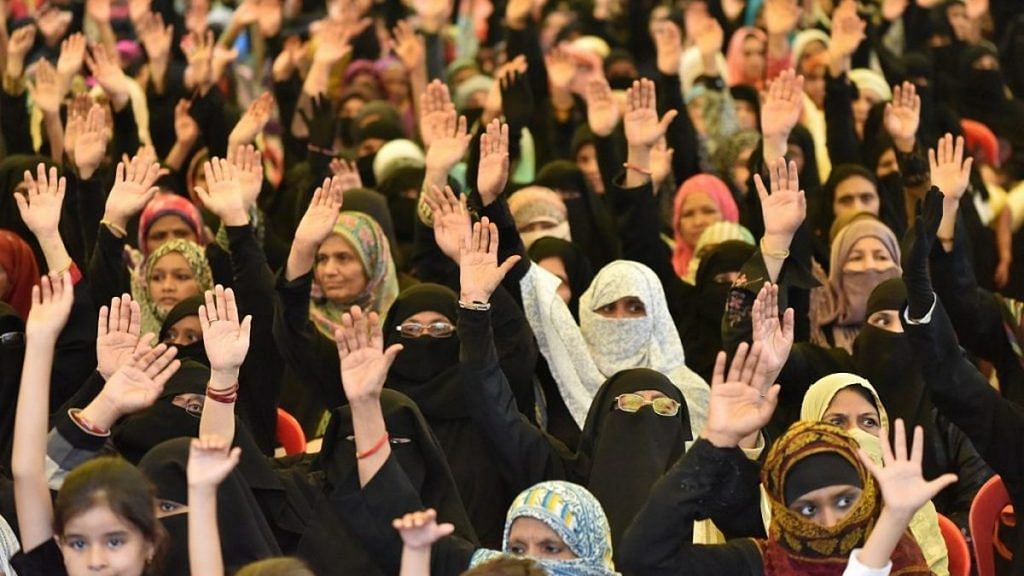Across the Jaipur, Sikar and Jhunjhunu belt, the general refrain among Muslim women is that the government shouldn’t tinker with Sharia laws.
Jaipur/Sikar/Jhunjhunu: After the landslide victory in Uttar Pradesh elections last year, the Bharatiya Janata Party (BJP) had claimed that many Muslim women had supported the party after it brought a bill in Parliament criminalising the practice of instant triple talaq.
But Muslim women in Rajasthan say it won’t get the party any electoral dividend in the state which votes on 7 December.
Across the Jaipur, Sikar and Jhunjhunu region, women from the minority community call triple talaq a non-issue even as they demand better education and implementation of various government schemes.
“In the name of triple talaq, the government is targeting Muslim women. If the government instead makes education till Class 12 mandatory for girls, triple talaq will automatically become a non-issue. Because an educated girl will decide her own future,” said Sabera Mirza, a resident of Katrathal village, Sikar.
According to Census 2011, Muslims in Rajasthan constitute 9 per cent of the state’s total population of 6.86 crore.
While the BJP has given a ticket to only one Muslim candidate in Rajasthan, Congress has so far fielded 14 candidates from the community.
Also Read: Modi govt takes the ordinance route to criminalise triple talaq
‘Congress didn’t interfere’
The general refrain among Muslim women in the region is that the government should not tinker with Sharia laws.
Shabana Parvez, a resident of Jaipur’s Ramganj Bazaar, a Muslim dominated locality, said triple talaq is “a personal matter and should be kept within the family. And families should discuss and sort issues.”
“At least Congress never attempted to interfere with Sharia,” said Parvez.
Jaipur-based Yasmeen Farooqui, member of All India Muslim Personal Law Board, said the government is trying to cover up other issues, like farmers’ distress and poor law and order, by raking up the concern of triple talaq.
“If you really want to help Muslim women, then raise issues related to their health, education, safety and equal pay at work. Bringing ordinance to criminalise instant triple talaq is not going to help Muslim woman,” said Farooqui.
Iffat Jahan, a housewife from Jaipur’s Ramganj Bazaar area, said Muslim women are made to run around in circles when they go to claim benefits under the various state government schemes because “we are not literate.”
Presently, about half-a-dozen schemes are run by the Centre and the state that target women. These include schemes such as Bhamashah, under which a woman is made the head of her family and all financial entitlement of family members is transferred to her account; Ujjwala, under which LPG connection is given to women from BPL households; and Matru Vandana, under which a pregnant woman who is not in regular employment gets Rs 6,000.
The women from the minority community also said that the Vasundhara Raje government has launched several schemes targeting women but their implementation is poor.
“The chief minister launches a programme but she should check whether they are being implemented or not. I have a Bhamashah card but am yet to get the services because the machine at the hospital does not recognise my fingerprint,” said Asmat Tara, a Jaipur resident.
Also Read: Rajasthan polls: How Vasundhara Raje managed to have the final say in ticket allotment
‘Discrimination over religion’
Residents living in predominantly Muslim localities in Jaipur city say there is a growing feeling that the community is being discriminated against when it comes to accessing even basic services.
“Every time I go to a hospital, I get a feeling that I am being discriminated because of my religion. I am made to wait in queue far longer than if the patient is a Hindu,” said Jahan.
She added, “It’s not a one-off incident. It was not like this earlier…. It has increased in the last three-four years.”
Shumail Soudagar, who runs a travel agency in Ramganj Bazaar, said that it’s a fact that Muslim dominated areas are treated differently from the Hindu neigbourhood.
“You check and see for yourself. While you see garbage strewn in the open in Ramganj Bazaar with no sign of any municipal agencies, you will hardly see garbage lying in the open in the adjoining Hindu locality,” said Saudagar.
A senior BJP leader in the state, however, denied that the government discriminates on religious lines.
“This is not true. Nobody is discriminated against on religious ground,” said the leader who did not wish to be named.
